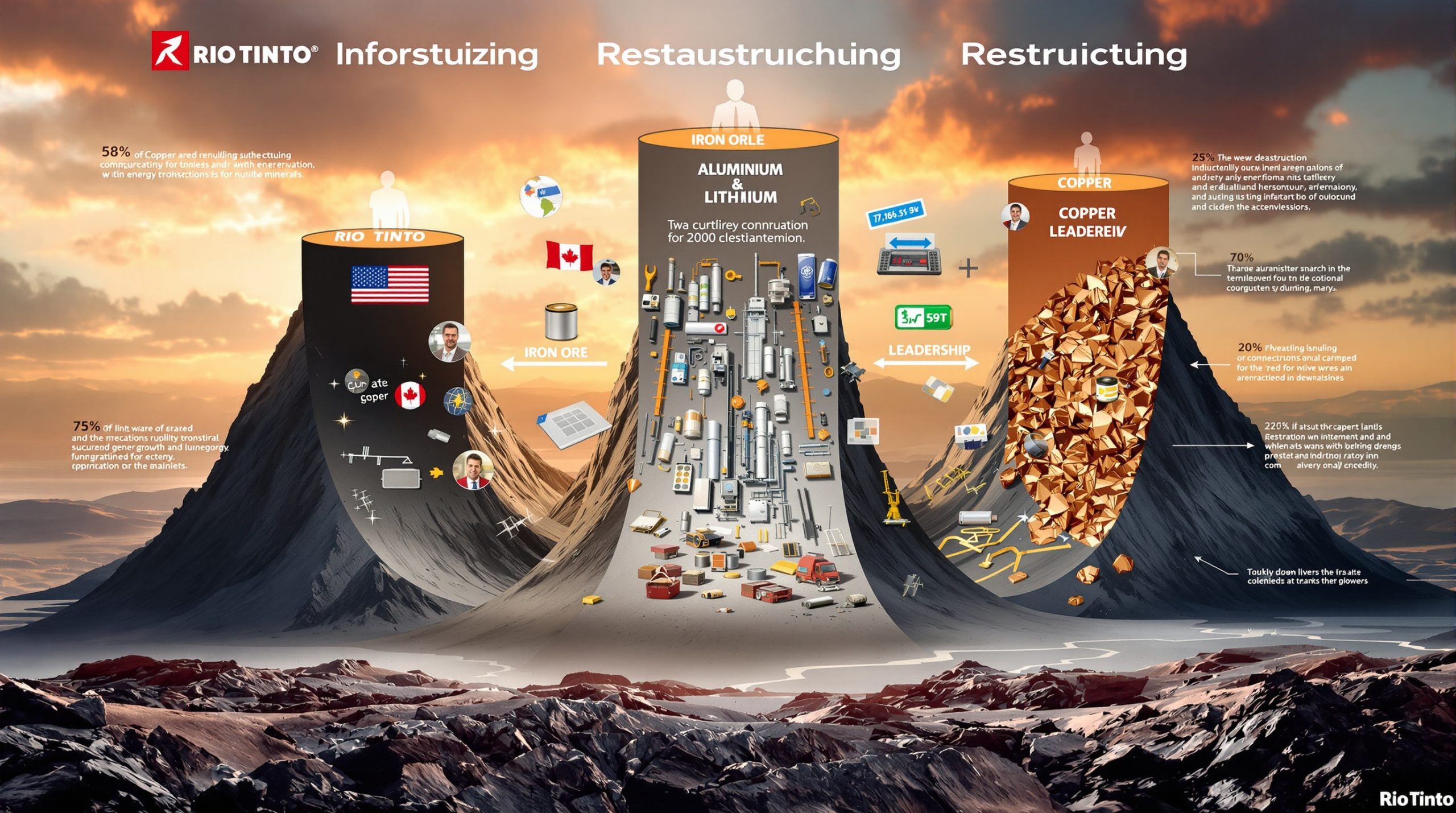The Strategic Importance of Congolese Minerals
The Democratic Republic of Congo (DRC) has emerged as a critical battleground in the intensifying US-China competition for strategic resources. As the world's second-largest copper producer and home to approximately 70% of global cobalt reserves, Congo's mineral wealth has become increasingly vital to America's economic and national security interests.
The country's vast copper deposits—yielding approximately 1.8 million tonnes annually—form the backbone of electrical infrastructure worldwide. However, it's Congo's dominance in global cobalt supply that truly elevates its strategic importance. This bluish-gray metal is essential for lithium-ion battery cathodes, making it irreplaceable in the global transition to electric vehicles and renewable energy storage systems.
"The race to secure Congo's mineral resources represents one of the most consequential geopolitical competitions of the decade, with implications extending far beyond Africa's borders." – Bloomberg News, July 2025
Historical foreign investment in Congo's mining sector has been plagued by exploitation, corruption, and political instability. Colonial-era extraction by Belgium gave way to decades of problematic deals under Mobutu Sese Seko and subsequent regimes. Today's investment landscape, while still challenging, operates under greater international scrutiny and a revised mining code implemented in 2018.
The Trump administration has prioritized "strategic minerals" as a key national security concern, viewing Congo's resources as essential to countering China's estimated 60% control of global cobalt processing. Trump's critical minerals policy represents a significant shift from previous approaches, placing mineral security on par with traditional defense priorities.
Who Are the Key Players in the Chemaf Acquisition?
The US Consortium Structure
At the center of the potential acquisition is a sophisticated American consortium combining financial firepower with operational expertise. Orion Resource Partners, a New York-based investment firm managing approximately $8 billion in assets, provides the financial backbone for the deal. The firm specializes in mining-sector investments and commodity trading, with particular focus on metals critical to energy transition.
Virtus Minerals brings on-the-ground operational capabilities through its ROK Metals division, which established a foothold in Congo's mining sector by acquiring a processing facility in 2023. This previous investment demonstrates both commitment to the region and practical experience navigating Congo's complex business environment.
What distinguishes this consortium is its leadership profile. Several key executives at Virtus Minerals come from intelligence and special operations backgrounds, including former CIA operatives and Special Forces veterans. This unusual concentration of security expertise reflects the complex risk environment of Congo's mining sector and the strategic nature of the acquisition.
The consortium's structure divides responsibilities along clear lines: Orion would provide financing and investment oversight, while Virtus/ROK would manage daily operations and security. This arrangement leverages each partner's strengths while mitigating operational risks in a challenging environment.
The Current Ownership Situation
Chemaf Resources stands as a significant player in Congo's copper and cobalt landscape, with operations including the Etoile mine and processing facilities near Lubumbashi. Currently owned by Shiraz Virji, the company has faced funding challenges that prompted its placement on the market nearly two years ago.
Commodity trading giant Trafigura has provided financial backing to Chemaf, establishing offtake agreements for its mineral production. This relationship highlights the integrated nature of global commodity markets, where traders often provide operational funding in exchange for guaranteed product access.
The company's sale process has been protracted, with previous attempts failing to reach completion. Most notably, a deal with China's Norinco Group collapsed in March 2025, setting the stage for the current American bid. Chemaf's continued operation during this extended sale period demonstrates both its underlying asset value and the complexity of completing major transactions in Congo's mining sector.
Why Did the Previous Chinese Acquisition Attempt Fail?
The collapsed deal between Chemaf and China's Norinco Group offers a revealing case study in the geopolitics of strategic minerals. In March 2025, what appeared to be a finalized acquisition unraveled when Congolese authorities withheld necessary approvals.
State mining company Gécamines played a pivotal role in blocking the transaction. As the government's mining arm, Gécamines maintains significant influence over sector approvals, particularly for projects deemed strategically important. Their resistance to Norinco's entry into Congo's cobalt sector proved decisive.
A critical factor in the deal's collapse was Norinco's unique profile. As a state-owned weapons manufacturer with direct ties to China's military establishment, Norinco's proposed acquisition raised red flags regarding the militarization of resource control. This concern provided legal justification for blocking the sale under Congo's mining code provisions.
Washington's diplomatic pressure significantly influenced the outcome. According to Bloomberg News, US officials engaged intensively with Congolese counterparts, emphasizing security implications of allowing a Chinese military-affiliated company to control strategic mineral resources. This intervention exemplifies the Biden administration's continued focus on securing critical mineral supply chains.
What Are the Geopolitical Implications of This Potential Acquisition?
The potential American acquisition of Chemaf represents a significant evolution in US resource strategy. The Trump administration has built upon earlier efforts to secure critical mineral supply chains, elevating the issue to a top-tier national security concern. This policy continuity across administrations underscores the bipartisan recognition of mineral security's importance.
US efforts explicitly aim to counter Chinese dominance in critical mineral supply chains. China currently controls approximately 60% of global cobalt processing capacity, creating a strategic vulnerability for American manufacturers of electric vehicles, electronics, and defense technologies. The Chemaf acquisition would represent a tangible step toward diversifying supply chains away from Chinese control.
Congo's position in this competition is complex. The country benefits from investment competition but must navigate competing interests of global powers. President Félix Tshisekedi's administration has shown increasing willingness to leverage Congo's mineral wealth for diplomatic advantage, balancing relationships with both Washington and Beijing.
"For Congo, the strategic minerals race offers both opportunity and risk—the chance to extract better terms from foreign investors while avoiding becoming collateral damage in a superpower competition." – Bloomberg Analysis, 2025
The acquisition would likely impact global copper and cobalt markets by signaling stronger Western commitment to direct resource investment. This could influence copper price insights and investment patterns across the sector, particularly for battery materials critical to energy transition technologies.
How Would This Acquisition Transform Congo's Mining Landscape?
Under US management, Chemaf operations would likely see significant changes in several key areas. The consortium would be expected to implement stricter environmental, social, and governance (ESG) standards, aligning with growing Western investor demands for responsible sourcing. This could include improved labor practices, reduced environmental impacts, and enhanced community engagement programs.
Investment projections, while not publicly detailed, would likely focus on operational modernization and production expansion. American access to capital markets could accelerate development timelines for Chemaf's projects, particularly expansion of processing capacity at existing sites.
For local communities, the acquisition presents both opportunities and challenges. Potential benefits include job creation, skills development, and community investment programs. However, questions remain about how benefits would be distributed and whether local supplier development would be prioritized.
Compared to Chinese-owned operations in the region, American management would likely emphasize different priorities. Chinese investments typically focus on rapid resource access and production scale, while US operations tend to prioritize operational efficiency, technology deployment, and risk management. This distinction could establish new benchmarks for mining sector practices in the region.
What Challenges Face the US Consortium?
The acquisition faces multiple hurdles before completion. Regulatory approvals represent the most immediate challenge, requiring sign-off from multiple Congolese authorities including the Ministry of Mines and Gécamines. The consortium must navigate a complex approval process that balances technical, financial, and political considerations.
Financial challenges exist in a volatile commodity market environment. Copper prices have experienced significant fluctuations, while cobalt has seen dramatic price swings in recent years—dropping approximately 20% in 2024 alone. This volatility complicates valuation and return projections for the acquisition.
Operational complexities in Congo's mining sector include infrastructure limitations, power supply constraints, and security concerns. The consortium's leadership, with its military and intelligence backgrounds, may provide advantages in navigating these challenges but must still develop effective local partnerships.
Competition from other international investors remains strong. Chinese companies continue to pursue Congolese mining assets despite the Norinco setback, while mining majors from Europe, Australia, and Canada maintain active interest in the region. This competitive environment could impact acquisition terms and timelines.
What Does This Signal About Future US Resource Strategy in Africa?
Broader Investment Patterns
The Chemaf acquisition bid represents part of a broader shift in US resource strategy across Africa. Under the Trump administration, American mining initiatives have expanded beyond traditional focuses in Ghana and South Africa to include emerging producers like Zambia, Tanzania, and Namibia.
This approach fits within Washington's evolving strategic minerals policy, which increasingly views secure resource access as essential to both economic competitiveness and national security. The combination of private capital (Orion) with operationally focused companies (Virtus/ROK) demonstrates the public-private partnership model favored in current US resource strategy.
The cobalt and copper sectors will likely see additional US acquisition activity if the Chemaf deal succeeds. Several mid-tier mining companies in Congo's Copperbelt region could become acquisition targets, particularly those with advanced projects requiring capital for development.
Public-private partnerships will continue playing a central role in resource security initiatives. The US Development Finance Corporation (DFC) has expanded its mining sector involvement, providing loans and political risk insurance for strategic mineral projects aligned with American interests.
Implications for Global Supply Chains
The acquisition could significantly impact copper and cobalt pricing dynamics by introducing another major Western player into production landscapes currently dominated by Chinese interests. This diversification might reduce price volatility over time while potentially raising procurement costs for Chinese manufacturers.
Critical mineral supply networks are already being reshaped by geopolitical competition. The US–China trade impact would accelerate this trend, potentially creating parallel supply chains—one Chinese-dominated and another Western-aligned—for battery materials and related technologies.
Downstream industries like electric vehicles and electronics manufacturing will face both opportunities and challenges. Greater supply diversity enhances security but may initially increase costs as new supply chains develop. American and European manufacturers may gain preferential access to Chemaf's output, strengthening their competitive positions.
Long-term strategic positioning in energy transition materials represents the ultimate prize in this competition. The consortium's move for Chemaf reflects recognition that controlling cobalt and copper resources today secures advantages in tomorrow's clean energy economy, where critical minerals demand will continue to grow.
FAQ: US Investment in Congo's Copper Sector
What makes Congo's copper and cobalt resources globally significant?
The Democratic Republic of Congo produces approximately 1.8 million tonnes of copper annually, making it the world's second-largest producer. Even more critically, it supplies over 70% of global cobalt, an essential component in batteries for electric vehicles and renewable energy storage systems. This concentration of resources makes Congo effectively irreplaceable in global supply chains for energy transition technologies.
How much is Orion Resource Partners investing in this acquisition?
While exact figures remain undisclosed, Orion manages approximately $8 billion in investments across private equity and commodity trading sectors, indicating substantial financial capacity for this acquisition. The firm's mining-focused investment strategy suggests this represents a significant commitment of their portfolio resources.
What experience does Virtus Minerals have in Congo?
Virtus operates in Congo through its ROK Metals division, which acquired a processing facility in 2023, demonstrating existing operational experience in the region's challenging mining environment. Their leadership team's background in intelligence and special operations provides additional capabilities for managing complex security and political environments.
How does this acquisition align with US national security interests?
The acquisition represents a strategic move to secure supply chains for critical minerals essential to defense technologies, renewable energy systems, and advanced manufacturing, reducing dependence on Chinese-controlled resources. The Biden administration has identified battery materials like cobalt as central to both economic competitiveness and defense capabilities.
What happened to the previous Chinese acquisition attempt?
A deal with Chinese state weapons manufacturer Norinco Group collapsed in March 2025 when Congolese authorities, including state mining company Gécamines, refused approval following pressure from Washington. The combination of Norinco's military connections and American diplomatic intervention proved decisive in blocking the transaction.
What is the expected timeline for completing this acquisition?
While specific timelines remain undisclosed, sources indicate that negotiations are in advanced stages, with the American consortium positioned as the frontrunner to complete the transaction. Regulatory approvals typically require 3-6 months in Congo's mining sector, suggesting potential completion by early 2026 if the process advances smoothly.
Disclaimer: This article contains speculative analysis regarding future market developments and geopolitical outcomes. Readers should consider multiple information sources when making business or investment decisions related to the mining sector.
Ready to Capitalise on Major Mineral Discoveries?
Stay ahead of the market with Discovery Alert's proprietary Discovery IQ model that instantly identifies significant ASX mineral discoveries and turns complex data into actionable investment insights. Visit our dedicated discoveries page to understand how major mineral finds like those discussed in Congo can generate substantial returns.




